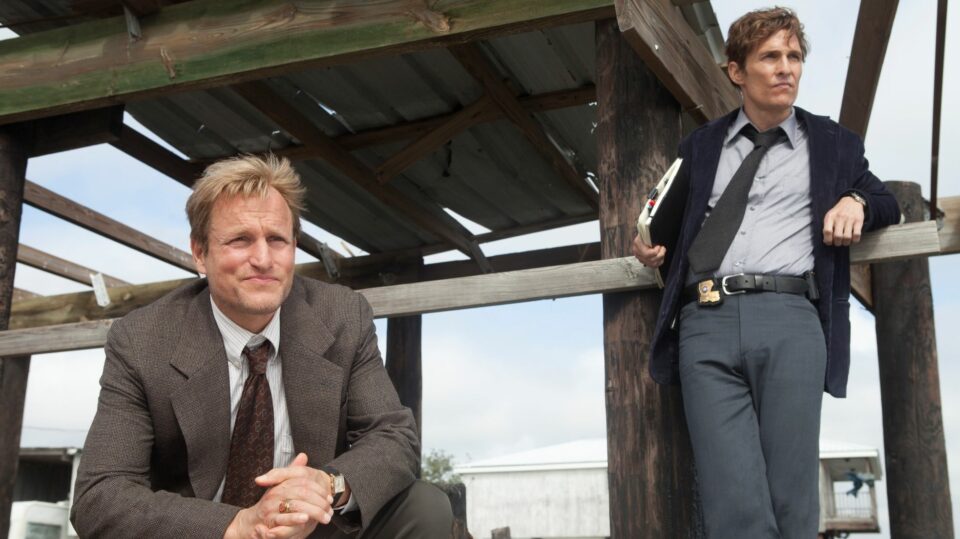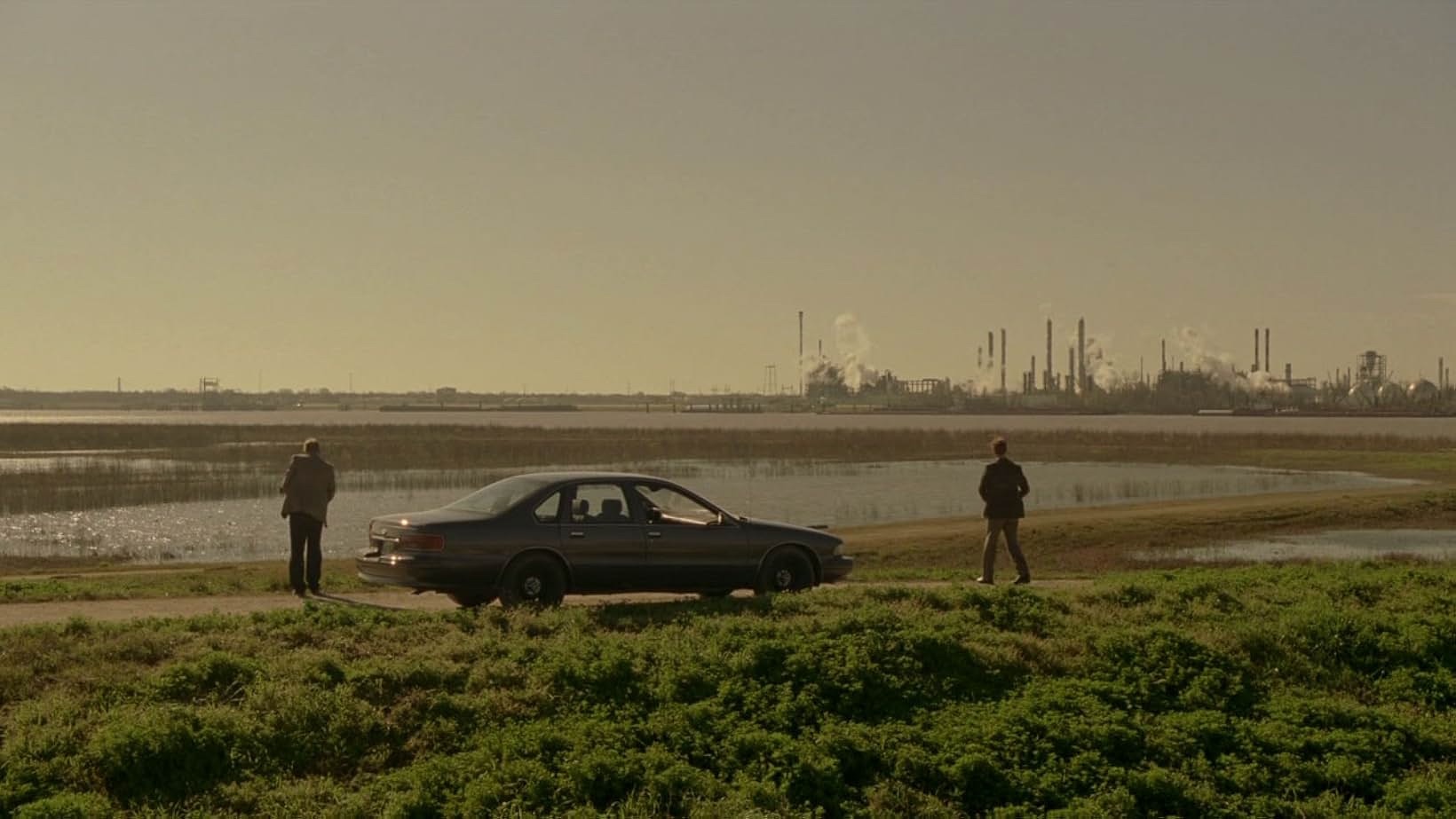“Happy” by Pharrell Williams is the biggest song of the year. Frozen is the latest Disney phenomenon. The Ferguson protests begin and continue, and there’s only a handful of precious years until the Trump/Clinton presidential showdown. True crime hits its stride in the fall, climbing in popularity with the debut of Serial, one of the first podcasts credited with the genre’s resurgence. RuPaul’s Drag Race season six is on the air, but the Supreme Court still hasn’t ruled in favor of same-sex marriage yet.
It’s 2014 and I’m inexplicably dating a painfully evangelical Christian musician with a pop-culture vendetta. When I get hammered at the usual decrepit bars in Texas, my peers chatter incessantly about the must-watches of the season: Game of Thrones, Breaking Bad, The Walking Dead. As a survivor of abuse and sexual violence, I avoid many of these mainstream hit shows—triggered, as we’d say these days. There’s also a distinct possibility that, like a true millennial hipster, I have an aversion to hype. In the Southwest, though, the first season of True Detective is airing and it’s the talk of the Gulf Coast. From SNL to the unfolding McConaissance, the zeitgeist grabs hold of the bayou-soaked buddy-cop crime-drama series and refuses to let go.
A decade has passed, and I’m finally ready to make up for lost time. Maybe it takes that long to recover and rediscover. My partner also insisted that I’d feel right at home in the gorgeously shot Southern Gothic. It’s likely the presence of a moody Matthew McConaughey in his prime that tipped the scale in True Detective’s favor, although the gaggle of awards it won—including Golden Globes, Emmys, and a Peabody—didn’t hurt. Regardless, I dove in.
The series follows the philosophically mismatched detective duo Rust Cohle (McConaughey) and Marty Hart (Woody Harrelson in the toupee of the century) between 1995 and 2012 in rural Louisiana. In a move I like to call “The Tarantino,” True Detective unfurls as a reverse chronological/nonlinear narrative that begins in media res. It’s a cerebral move from the show’s writer and producer, Nic Pizzolatto, who’s also an award-winning novelist and former literature professor. Pizzolatto’s background isn’t surprising, given his lit-bro aesthetic tendencies including an antihero waxing poetic on a near-constant basis (Cohle) and a narrative centered on violence, corruption, repression of male emotion in a patriarchal society, and the occult. The audience is saddled with the renegade spirit from the show’s opening credits as “Far From Any Road” by The Handsome Family plays.
Talking heads and flashbacks initially guide the viewer through the ways that a disturbing ritualistic murder case—and Cohle and Hart’s follies, of course—had grueling effects on their respective lives. As our boys are interviewed by law enforcement, the strange case of Dora Lang is presented: a woman found naked against a tree in some cane fields on her knees with antlers attached to her head in 1995. At the show’s midway point, the structure gives way as the men are begrudgingly reunited in the present day. A similar killing has occurred recently, and we’re faced with a horrific dilemma: Could Cohle be the bad guy, or is there a larger, state-wide religious and governmental conspiracy at play involving animal masks and ritual sacrifice?
At its heart, True Detective is the love story of male friendship wrapped in a noir with undeniable Lynchian DNA. Twin Peaks is a natural comparison. Both shows have dead white girls in rural areas, rednecks, charismatic detectives, and vaguely spiritual/supernatural flourishes. True Detective is less quirky, although Woody “Stop Saying Odd Shit” Harrelson notably brings some enjoyable levity to his role. The cinematography is distinctly atmospheric and deserves its praise. The shots linger; they meditate and romanticize a flat landscape punctuated with refineries. The long stretches of nothing that characterize drives down south are captured beautifully and with reverence. The swamp water air hangs heavy, and the cicadas scream.
Rust is the beloved misanthrope of the pair. He’s our Byronic hero who drinks Lone Stars during questioning and makes chain-smoking alluring. He’s got trauma and the jaded soliloquies to match.
Both McConaughey and Harrelson feel as though they authentically belong to this place—partially because they do (their drawls come straight from West Texas, at least a close cousin to Louisiana). They’re also undeniably brilliant actors who imbue their characters with a level of captivating subtlety. Rust is the beloved misanthrope of the pair. He’s our Byronic hero who drinks Lone Stars during questioning and makes chain-smoking alluring. He’s got trauma and the jaded soliloquies to match. What is it about a gravelly voiced cowboy with a storied past that’s so irresistible? “I can be hard to live with,” says Rust. “Sometimes I think I’m just not good for people, that it’s not good for them to be around me. I wear ’em down.”
His charm lies in his critical awareness of himself and others. While the good-guy/bad-guy dichotomy—the familiar light-versus-dark Star Wars trope—is a sticking point for these two, Rust is the preferable hero, albeit reluctant. He’s a loner with a heart of gold, the good guy who knows he’s a bad guy. He’s hot, strong, and durable. Of the two, we hope we’re like Rust, but few of us possess the fortitude needed to confront that degree of self-loathing. “Do you wonder ever if you’re a bad man?” asks Hart. “No, I don’t wonder, Marty,” Cohle responds. “The world needs bad men. We keep the other bad men from the door.” Swoon. Cohle and Hart are just the cutest of frenemies.
Like most pieces of American modern art created by white men, True Detective’s first season is about cowboys or men who fancy themselves as such. This series complicates the audience’s expectations a bit in its two distinct, antagonist variations of the popular trope. Opposite Rust is Marty, a reckless and chaotic man who’s hot-headed but loyal to Rust. He’s a self-proclaimed “regular-type dude with a big-ass dick.” Jesus. Like many men who enter “the force” or similarly supposedly “valiant” fields, Marty’s concerned with protecting the defenseless (read: women and children), and yet he’s exposed as the very source of some of that violence. He’s a cheater who’s physically abusive to his wife and one of his daughters, as well as maniacal to the men who interfere with them. You can’t be both a good guy and a hypocrite.

True Detective season one / credit: James Bridges/HBO
Over the eight-episode first season, the audience is asked to accompany Marty and Rust on their searches for absolution via the corporeal carnage of women and children. In Dead Girls: Essays on Surviving an American Obsession, author Alice Bolin notes as much. “There can be no redemption for the Dead Girl, but it is available to the person who is solving her murder. Just as for the murderers, for the detectives in True Detective and Twin Peaks, the victim’s body is a neutral area on which to work out male problems.” The dead woman is a muse of sorts; a space for male characters to cultivate empathy and explore their humanity. It should be noted as well that in this country it’s a privilege to be a dead white girl, because your murder will actually be investigated. Violence against Indigenous women in the US and Canada, for example, is particularly horrendous. Tangentially related, I found the relative whiteness of the show’s characters puzzling given its setting.
For all of the complexities and nuances afforded to Marty and Rust—and to Louisiana’s landscape, even—the same generosity isn’t extended to any of its female characters. The lack of depth and agency is a problem hardly specific to this series, sadly. Marty’s wife Maggie, played by Michelle Monaghan, is a notable exception, showcasing emotional intelligence. She’s got a few witty zingers, but her character arc and eventual betrayal feel somewhat contrived. I’m hopeful that writer/director Issa López’s involvement in season four of the show has led to a more balanced portrayal of its female leads. It would be interesting to compare her approach to the series with that of previous seasons.
The dead woman is a muse of sorts; a space for male characters to cultivate empathy and explore their humanity.
One saving grace amidst all of the rape and murder of the show is that the shots of the abused aren’t grotesque. Director Cary Joji Fukunaga should be credited for the nuance and respect in such filmographic decisions (the viewer isn’t allowed to linger on disturbing images for lengthy periods, and in the worst cases, he cleverly avoids showing them), although it certainly should also be noted that allegations of abuse against Fukunaga himself have surfaced since the series’ filming.
True Detective further stands out by eschewing the typical portrayal of cops as flawless heroes as it dives into the darker aspects of law enforcement, exploring themes of corruption, abuse of power, and the blurring of lines between cop and criminal. This is emphasized by the revelation that McConaughey’s character is himself under investigation, highlighting the hypocrisy of the police force.
By the end, it’s revealed that the killer is a he, as most serial killers are. The killer is enigmatic, gross, and a formidable final boss enmeshed in a tangled conspiracy involving impoverished Christian schools across the Louisiana coast. Bolin succinctly sums it up: “But it’s an understandable temptation for investigators to view criminals as mythic opponents, to create a theory of violence that looks at the gun, not at where it’s pointing. Because when you take away the monster, what are you left with?”
What should I watch next? The Sopranos? The one with the dudes cooking meth in the desert? Honestly, anything exposing our failed justice system with men earnestly crying is a go for me. FL







